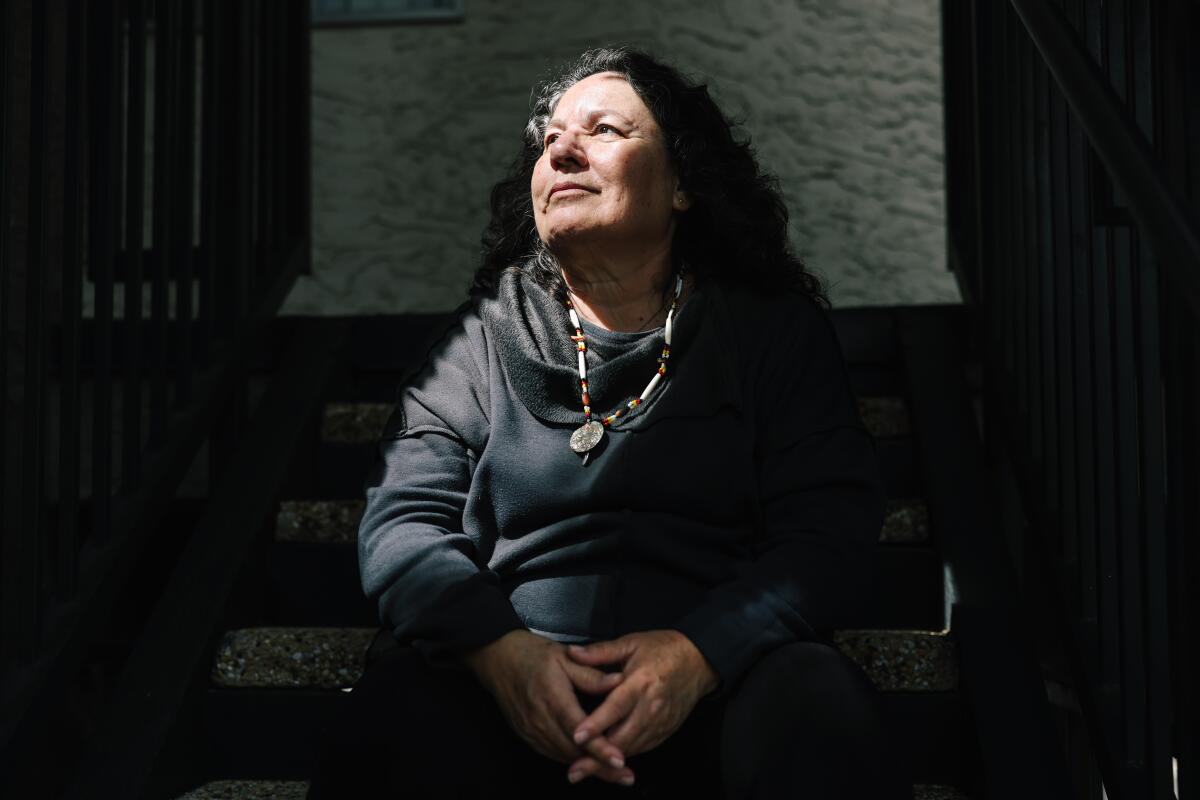For domestic violence victims who commit violent crimes, new bill provides hope

- Share via
When Susan Bustamante was on trial for murder in 1987, she was not able to give her side of the story.
She was convicted in a two-day trial of helping her brother kill her husband for a $50,000 insurance payout. Before the killing, she had revealed to her brother that she was a victim of intimate partner violence.
“Nothing was allowed on domestic violence,” Bustamante said. “They said [my husband] wasn’t on trial, I was.”
Bustamante is among a group of women convicted of violent crimes who could benefit from the passage of a bill in the state Assembly that would allow victims of human trafficking or domestic violence who allegedly committed violent crimes to present evidence of their abuse as an affirmative defense at criminal trials. The bill would also allow survivors to use their evidence of abuse after being convicted of violent crimes to petition to have their cases vacated.
Bustamante was granted clemency in 2017 and released from prison the following year, but her case has not been vacated. The bill could also help other abuse and trafficking victims still behind bars.
Corene de la Cruz was convicted of assault with a firearm after shooting her ex-boyfriend in Los Angeles County in 2010. De la Cruz, who said she was a victim of verbal, physical and emotional abuse at the ex’s hands, said that she had arrived at her ex’s home planning to kill herself, but a struggle led to the gun going off and shooting the man.
Her ex claimed that De la Cruz said that she had come to the house to kill herself and him.
“My only resolution at that time was to feel like [my family] would be better off without me,” said De la Cruz about her decision to kill herself. “I would have never thought about hurting him of all people... Thinking back to that day, all of it was very surreal to me. I’m grateful he survived.”
De la Cruz was sentenced to more than 22 years in prison — though she was acquitted of the most serious charge of attempted murder — and says the new law could help her. She is currently being held at the California Institution of Women in Corona.
“It’s just about being able to look at everything as a whole. It is important to get all the facts and allow each side to tell their story,” De la Cruz said.
She and Bustamante know dozens of other women in prison who share similar stories. In prison, Bustamante advocated for women to be able to present evidence of their abuse as early as the 1990s. She was a member of a group of more than 30 women behind bars at the California Institution of Women who would gather to discuss the abuse they suffered that they said led to their crimes.
The new bill follows one from 2021 that passed with similar language — but that bill did not expand relief to victims of human trafficking or domestic abuse who commit violent crimes. The bill allowed defendants to present evidence of human trafficking or domestic violence only if they were charged with a nonviolent crime.
The expansion of the law to include violent crimes could make it a harder sell in the state Legislature.
“When they have to put this thing to a vote when you’re trying to convince a majority that someone who’s done something like murder deserves a break because they’ve been a victim, it’s a tough sell,” said Lou Shapiro, a Los Angeles-based defense attorney.
State Assemblyman Matt Haney (D-San Francisco), who authored the new bill, said that the 2021 bill helped achieve justice for victims of abuse, but that it should be expanded to all crimes, not just nonviolent ones.
“People should be accountable and held accountable for things they’ve done and to achieve full justice that should include their own experiences as victims,” Haney said.
For the women who see themselves as victims who committed crimes when they saw no other options, the passage of the bill would grant them a voice — even decades after the fact.
“Going through years and decades of prison you’re still not heard. So many are still in custody for what reason? So many factors keep people in for decades. This would at least give them a chance to be heard,” said Bustamante.
More to Read
Sign up for Essential California
The most important California stories and recommendations in your inbox every morning.
You may occasionally receive promotional content from the Los Angeles Times.











